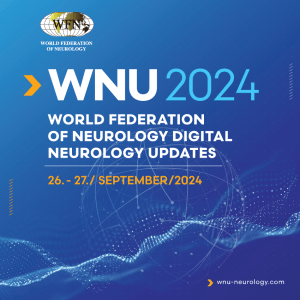
The annual Clinical Neurosciences President’s Prize Meeting provides a forum for trainees to discuss their shared interest in neurology, neurosurgery, or neuroradiology. The evening comprised a series of five lectures given by trainee doctors either on their research or on interesting neurological cases. A wide range of subject matter was covered, with topics ranging from research into intra-operative nerve conduction monitoring to case presentations on post-stroke psychosis. Whatever your medical background, whether accomplished neurologist or junior trainee, there was something to pique your interest.
The session began with a brief, light-hearted introduction from Mr Michael Powell, consultant neurosurgeon and the president of the RSM’s Clinical Neurosciences Section. He enthusiastically praised the five selected speakers, and offered only one piece of advice: to keep to time!
The evening’s highlight was the lecture given by Dr Michael Devine of Imperial College London. He began by outlining the symptoms experienced by three different patients following a stroke. The patients had a variety of the expected neurological deficits, from hemiparesis to tangential speech. However, they all had one unusual symptom in common: psychiatric disturbance. The psychiatric disturbance manifested itself as persecutory delusions, hallucinations, or Fregoli syndrome (delusional mis-identification of people). Analysis of the CT imaging for these patients showed that the right inferior frontal gyrus was involved in all patients. However, many patients with a stroke of the right inferior frontal gyrus do not experience psychiatric disturbance, suggesting that there may be an element of behavioural susceptibility. Dr Devine was a well-informed and amicable speaker, and a deserved recipient of the 2013 Clinical Neurosciences President’s Prize.
Some of the speakers were caught out by their enthusiasm for their selected topics. Their desire to be comprehensive clashed with the chair’s desire for accurate time-keeping! Despite this, all five speakers were an excellent advertisement for UK neurology/neurosurgery trainees, and an inspiration for those seeking a career in these exciting fields. To close the event, Sir Graham Teasdale, the renowned professor of neurosurgery and inventor of the Glasgow Coma Scale (GCS), gave a charming presentation on life in research.
In previous years, this event has failed to attract large audiences, and that continues to be the case. The 2013 annual meeting was attended by a mere 30 doctors, almost all of whom had some professional or personal connection to one of the five speakers. This thoroughly enjoyable and thought-provoking event deserves a larger audience. Hopefully, in years to come more trainees physicians will attend.
